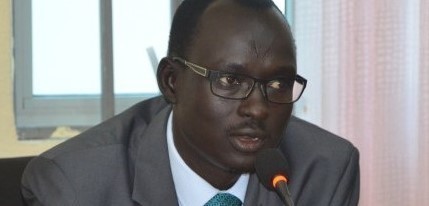Economist: Central Bank remedies to fix economy unrealistic

An economic analyst, Professor Akim Ajieth Buny, has said the raft of policy interventions announced by the newly appointed governor of the Bank of South Sudan (BoSS), Dier Tong Ngor, last week will have little or no impact in salvaging the economic cringe the country is grappling with.
At an extraordinary meeting last week, Tong announced that the monetary institution was increasing its interest rate to 15 percent, the cash ratio to 20 percent, and also introduced treasury bills to manage liquidity as some of the measures taken to address runaway inflation in the country.
However, Prof. Ajieth told Radio Tamazuj in an interview that the new policies cannot work in South Sudan’s unstructured economy.
“It is completely ambiguous and it is very difficult to know what they mean because in this country the interest rate does not work. We don’t have a housing market. It would work if we had a housing market because this is where you can increase the interest rate so that people who are buying houses or taking loans will have to pay something bigger and this is where the government will get something in return,” he said.
Ajieth added, “But in this market of ours, whether you increase or decrease the interest rate, it does not work. So I don’t know what they exactly mean since there is no borrowing. There is no one borrowing from the bank or from anywhere in the country so increasing or decreasing the interest rate is not going to have any impact on the economy.”
The analyst pointed out that the central bank already declared that they don’t have enough cash and pondered how the cash ratio policy would impact the market.
“I don’t understand how the cash ratio is going to help because they already declared that they don’t have enough cash in the central bank. Maybe what they meant is how much each person can withdraw from the bank," Ajieth said. “So they may be referring to a limit which is not another good strategy because if you are going to put restrictions on withdrawal from the bank, it will also create panic. That means people will go to the bank and try to withdraw all their money at once and take it to their houses and keep it under their pillows. Which is also not good.”
The economist says the new policies can work in more advanced economies but not in South Sudan.
“The implication will come overtime because the public is now thinking that there is something positive coming out of the government but with time they will discover there is nothing positive out of these policies and as a result things will go back to square one,” According to Ajieth. “The dollar will gain against the pound again. Once people discover that these policies are not working things will go back to the situation before.”
Asked what he suggested should be done to fix the economic mess the country is facing, Ajieth said, “What needs to be done are very simple. Number one, get the right people, and put them in the right places. And that means getting the right people and putting them in the central bank, in the ministry of finance and including the office of the president itself so that they can advise the president on what needs to be done.”
“In the longer term, you need to invest in housing because that is the engine of economic growth. The government needs to invest in housing by building some homes in Juba and the other cities,” Ajieth said. “That means people who are living outside of the country will come back to South Sudan and will spend less money outside the country. When people are sending less money outside that means you will not depend on dollars. The problem is that the dollar has now become a very expensive commodity because all the people in government have their families in Uganda and Kenya etc."
According to Ajieth, insecurity, lack of physical and social infrastructure have led to government officials moving their families to neighboring countries.